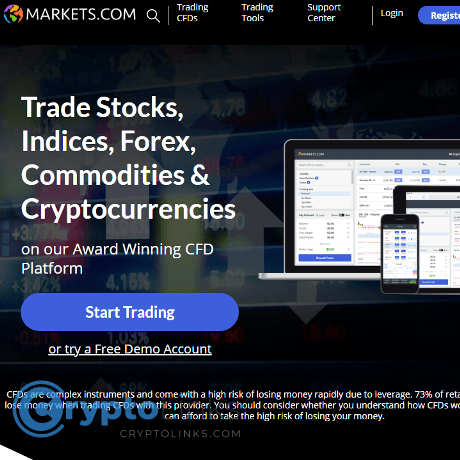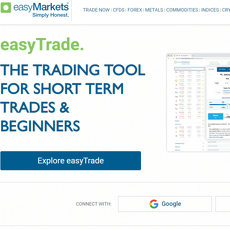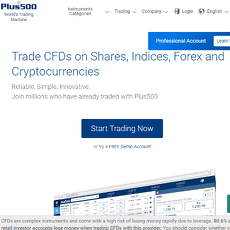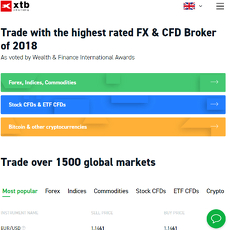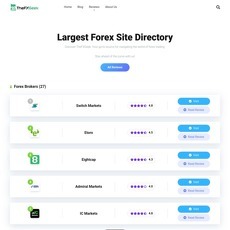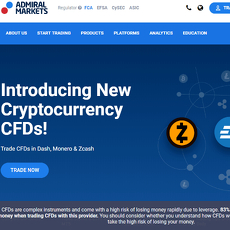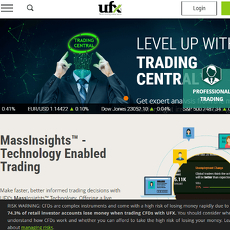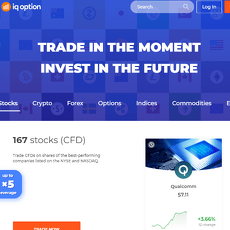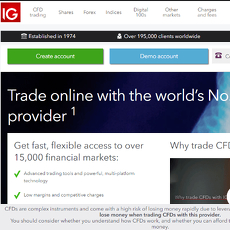Markets.com Review
Markets.com
www.markets.com
Markets.com Review Guide: Is It Worth Trading?
Have you ever thought about trading Bitcoin CFDs but found yourself overwhelmed with confusion and doubt?
If so, you're far from alone. Trading Bitcoin CFDs is incredibly appealing to traders looking to profit from Bitcoin's famous volatility. But here's the catch: there's no shortage of frustrating challenges that traders commonly face, especially when they are just starting out.
Common Problems Traders Face with Bitcoin CFDs
I’ve talked to many traders who shared their experiences, highlighting several recurring challenges. Here are the most common problems traders encounter when they first set foot in Bitcoin CFD trading.
Difficulty Understanding CFD Trading
Most traders initially stumble over the basics—I hear this often:
- "What exactly is a CFD anyway?"
- "If I'm not actually buying Bitcoin itself, how can I even make money?"
Such confusion can put off even the most enthusiastic crypto fans. And it's entirely understandable! CFD trading simply means you're predicting price movements rather than purchasing actual Bitcoin. But that's sometimes tough to wrap your head around when you're eager to dive into the action.
Choosing the Right CFD Platform
If you've ever searched online for a CFD trading platform, you'll know what an exhausting experience it can be. You have probably come across names such as Markets.com, eToro, Plus500, and more. Each comes with attractive promises of low fees, easy interfaces, and great trading experiences. But picking just one can feel stressful. How do you even know who to trust?
Selecting the right platform isn't trivial—traders often encounter a mix of frustration, confusion, and uncertainty. You need a platform that's easy to navigate, transparent about costs, offers strong trading tools, and ensures the security of your funds.
Confusion Around Fees and Deposits
No one enjoys surprise fees or confusing deposit requirements. Yet almost every trader I've talked to has had at least one experience of hidden fees quietly eroding their profits. Knowing the minimum deposit requirements upfront—and exactly how fees like spreads, commissions, and withdrawal costs work—can make or break your Bitcoin CFD journey.
Imagine planning a strategy only to discover a huge fee or finding that your deposit won't suffice. Having transparency about costs upfront is critical in avoiding costly surprises.
Solution: Your Complete Markets.com Guide
This is exactly why I'm providing you with a practical guide on Markets.com's Bitcoin CFD trading. My goal is to clarify all those burning questions, present the platform clearly, and ease anxiety on fees, deposits, and comparisons.
I’ll lead you step-by-step through Markets.com's offering, covering exactly what to expect, what to watch out for, and how you might use this information to your advantage to trade Bitcoin CFDs wisely.
Does CFD trading still seem unclear, intriguing or intimidating? Don’t worry—I’ve got you covered! In the next section, I’ll break it down in clear, easy steps, explain how it works practically, and reveal both the promising benefits and real risks. Curious yet? Keep reading because it just gets better!
Understanding CFD Trading: The Quick and Clear Way
Trading CFDs might feel overwhelming at first glance—I totally get it. You probably heard "Contract for Differences" and thought, "Okay, sounds complicated!" Let's cut through the confusion right now. A CFD is simply an agreement you make with your broker (like Markets.com) to trade based on Bitcoin's price movements—without actually buying and owning Bitcoin itself.
"Trading CFDs lets you speculate on prices without ever holding the actual asset. It's all about predicting market directions smartly."
How Does CFD Trading Actually Work?
Let's simplify with an easy example:
- Say Bitcoin currently trades at $20,000, and you believe its value will rise soon.
- You place a "buy" CFD trade on Markets.com worth one Bitcoin (BTC) at that price.
- If Bitcoin’s price rises to $21,000, you can close your position—and score a $1,000 profit without holding any Bitcoin directly! Pretty neat, right?
- But wait, what if Bitcoin drops instead? If the market moves against your prediction, say BTC falls to $19,500, you’ll see a loss of $500 when you close your position. That’s the simple reality—a straightforward risk-reward trade-off.
Opening and closing trades is quick and clear. You don’t need a wallet or worry about complicated blockchain transactions. Your profits or losses get credited or deducted instantly by Markets.com, making CFD trading accessible and intuitive.
Benefits vs. Risks of CFD Trading
Of course, like any financial tool, CFDs have pros and cons. Here’s the honest breakdown:
Benefits:
- Quick and easy access—no wallet setups.
- You can profit from both rising and falling Bitcoin prices (by choosing buy or sell).
- Ability to make leveraged trades, multiplying returns (we’ll talk about leverage soon!).
Risks:
- Leveraged trades amplify potential losses just as much as gains.
- Market volatility in crypto can be intense; prices can shift quickly.
- You aren't owning actual Bitcoin—if ownership is important to you, CFDs may not be your ideal choice.
A recent European study examining brokerage traders found that successful CFD traders typically had solid understanding of risk management, which leads me right into strategies you can apply later on in this guide.
Simple Examples of Bitcoin CFD Trading on Markets.com
Here's another concrete example to help you visualize clearly:
- You have a $500 trading account with Markets.com and observe Bitcoin priced at $30,000.
- You decide Bitcoin will decrease in value shortly, so you open a "sell" position with 2x leverage. This essentially means you're trading as if you owned $1,000 worth of Bitcoin.
- If Bitcoin falls to $29,000 as you predicted, you close your CFD position. Since Bitcoin dropped by roughly 3.3%, your leveraged trade earned double that percentage—6.6% profit—around $66 profit on your $1,000 trading size (a nice return, right?).
- But, if Bitcoin rose to $31,000 instead, you'd lose about $66 when closing the trade.
Now, with this clear picture, you're equipped well to grow confident in Bitcoin CFD trading.
But wait—you're probably wondering: How exactly do you know you can trust Markets.com as your CFD broker provider?
Is Markets.com genuinely safe and reliable? Let's find out together right now.
Markets.com Overview: Can You Trust Them?
Trust is crucial in trading, especially when you're betting on Bitcoin CFDs. So, let's face it head-on: Is Markets.com a place you can confidently put your money? Here's what I've found out for you.
A Brief Background on Markets.com
Markets.com started out in the financial trading industry back in 2008, making them veterans with over 15 years of history. That's a long time in the rapidly evolving world of cryptocurrency trading platforms! Owned by Finalto Group, a respected financial services company, Markets.com quickly built a sizable global presence. So it isn't a fresh-off-the-block startup; far from it. Experience counts, particularly in the volatility-packed crypto CFD space.
But experience alone isn't enough. Regulations and security measures matter big time. The reassuring news here:
- Markets.com operates under strict oversight by renowned financial regulatory bodies, including the Financial Conduct Authority (FCA) in the UK, Cyprus Securities and Exchange Commission (CySEC), and the Australian Securities and Investments Commission (ASIC).
- Client funds are safeguarded in segregated accounts, protected separately from the company's operational balances, meaning your money won't get 'mixed up' with the platform's expenses—always a critical reassurance.
- They regularly undergo external audits to confirm compliance with stringent financial stability requirements.
Markets.com Reputation: Pros and Cons
I always recommend checking real users' feedback from independent third-party sources like TrustPilot and Forex Peace Army. Why? Because clients' experiences tell us way more than polished ads ever will.
Here's a quick breakdown:
- Pros: Easy to use interface for beginners, responsive mobile and web platforms, a smooth sign-up process, reliable execution speeds, and excellent customer support available 24/5, helping you feel comfortable even if you're just starting.
- Cons: Some users point out that Markets.com's CFD spreads can feel slightly higher than competitors like Plus500. There's been occasional dissatisfaction over withdrawal times taking longer than expected. Nothing is perfect, right?
Reviews vary, of course, but it's worth noting most of Markets.com's traders seem satisfied, giving them solid scores averaging around four stars across major review platforms after thousands of testimonials. That's decent—but not flawless—quality proof.
Regulation and Security at Markets.com
Feeling safe is a non-negotiable when selecting your Bitcoin CFDs platform. Let's not sugarcoat it—some brokers out there are shady. Here’s one insight from seasoned investor Warren Buffett, who said:
"Risk comes from not knowing what you are doing."
Similarly, trading risk multiplies if you don’t understand who you're trading with. Fortunately, Markets.com clearly prioritizes security by:
- Ensuring compliance under credible regulatory oversight—FCA, ASIC, CySEC—each requiring strict adherence to client protection laws, transparency, and financial integrity.
- Employing modern encryption technology to secure your personal data and transactions at every step of your interaction.
- Offering negative balance protection, an essential safeguard preventing your account from going into a negative balance, which is critical, especially if you're a beginner experimenting with leverage.
I know what you're asking yourself right now: Okay, security checks out, but what about their actual CFD trading next-level features? Clearly security alone doesn't make a platform truly trader-friendly...
Stick around; because now we're about to see exactly how good (or mediocre) Markets.com is when it comes to Bitcoin CFD trading features, platforms, user experience, and their juicy demo account tricks—ready to find out more?
Bitcoin CFD Trading Features on Markets.com
One of the biggest questions most traders have when considering Bitcoin CFD trading on a platform like Markets.com is: "Does it actually make trading simpler, more convenient, and more effective?" After all, there's nothing worse than signing up for a platform that promises the world but delivers confusion and frustration instead.
So, what's Markets.com really like when it comes to trading Bitcoin CFDs? Let's break down some of the key points, so you'll know exactly what you're getting into.
Platforms Available for Bitcoin CFDs: Web, Mobile, and More
Markets.com understands modern traders appreciate flexibility and convenience, providing multiple accessible ways to trade:
- Web Platform: No installations or complicated setups needed; just open your browser, log in, and you're ready to trade. Ideal for beginners who appreciate simplicity.
- Mobile Trading App: Available on both Android and iOS, this app allows you to place Bitcoin CFD trades or monitor your open positions on-the-go. You won’t miss opportunities if you're stuck in traffic or waiting in line at your favorite coffee shop.
- MetaTrader Integration: For advanced users who prefer powerful analytical tools, Markets.com integrates seamlessly with the popular MetaTrader 4 and 5 platforms. You'll get access to advanced charting tools, technical indicators, and automated trading options.
Having plenty of options is great, but what really sets Markets.com apart is that they've managed to blend convenience with practicality—making trading flexible yet reliable.
User Interface: Easy for Beginners?
"Simplicity is the ultimate sophistication." - Leonardo da Vinci.
This quote sums up exactly what traders, especially beginners, want in a platform's interface. Nobody enjoys struggling through a cluttered mess of complex buttons and confusing interfaces that delay actions, especially when Bitcoin's prices move fast.
Fortunately, Markets.com understands this, and their trading interface is designed with clarity in mind:
- Simple Navigation: Clearly labeled options and menus ensure you can quickly find everything you need, whether that's setting up trades or checking your account balances.
- Clear Trading Process: Opening, modifying, or closing Bitcoin CFD positions involves just a few intuitive clicks, making sure newcomers aren't left scrambling around while experienced traders waste no time.
- Customizable Charts & Tools: Beginners can use predefined templates and indicators, while experienced traders can tailor them to specific strategies—making it easy for everyone.
More practically speaking, a simplified interface reduces the likelihood of costly mistakes while trading—a factor that seasoned traders emphasize consistently as crucial.
Demo Accounts: Practice First!
I can't stress this enough—using a demo account is game-changing. Think about it—would you enter a race without practice? Probably not. Then why risk your money trading without learning the ropes first?
Markets.com offers an incredibly easy-to-use demo mode:
- Risk-Free Practice: You get virtual money to practice opening Bitcoin CFD trades, adjusting orders, managing risk, and experimenting with strategies until you're comfortable.
- Realistic Market Environment: Demo accounts at Markets.com reflect current, real-world market prices, enabling you to understand precisely how your strategies would act under live trading conditions.
- No Time Limits: You can practice as long and as often as needed—perfect for new traders or when testing new strategies.
According to research, traders utilizing demo accounts first tend to perform better once they start trading real money, thanks to a stronger understanding of strategy and risk management fundamentals.
Still, you're now probably wondering— "All these features sound fantastic, right? But what's the bottom line—I mean, what will it really cost me to trade Bitcoin CFDs on Markets.com?"
Well, I thought you'd never ask! Let's answer that together as I explore costs and fees clearly in the next section. After all, keeping an eye on your budget might just be the smartest move you'll ever make in crypto trading. Ready for clarity on Markets.com's real costs? Let's find out!
Costs and Fees: How Much Does It Actually Cost to Trade Bitcoin CFDs Here?
Let’s face it, hidden fees and unexpected charges feel awful. Nothing kills trading enthusiasm faster than realizing you're paying more than you thought.
As trader Adam Grimes once wisely said:
"Trading success isn’t about finding indicators or secret setups; rather, it’s about controlling risk, emotion, and costs at every turn."
So if you're thinking about Bitcoin CFD trading on Markets.com, grabbing clarity about the fees upfront is crucial. No surprises, just transparency—so let's break it down and see what Markets.com really charges.
Initial Deposits and Account Funding
Good news first: Markets.com keeps initial funding pretty affordable. The required minimum deposit to start trading Bitcoin CFDs is only $100 USD. That means you can test the waters without risking a big chunk of your money.
You also have multiple easy payment methods, including:
- Credit/Debit cards (Visa, Mastercard, Maestro)
- Bank wire transfer
- E-wallets (PayPal, Skrill, Neteller)
The money typically shows up instantly if you pay with cards or e-wallets, but may take a couple of days by bank transfer.
Trading Fees & Spreads Explained
Now, let’s talk about ongoing fees, since they can majorly impact your profits. Markets.com doesn’t charge traditional commissions (thank goodness!), using a spread-based fee instead—that’s the gap between buy and sell prices.
Right now, the average spread for Bitcoin CFDs on Markets.com sits around $50 to $100, depending on market volatility. Watching volatility closely can help you find entry points when spreads are narrower—saving you more on each trade.
One important reminder:
- Overnight Fees: Holding your positions open overnight does incur an interest fee (also called swaps). This cost depends on how much you're trading, so always check the exact amount before leaving trades open overnight.
Withdrawal Fees and Procedures
Withdrawing quick profits feels fantastic, doesn't it? But hidden withdrawal fees—those are seriously frustrating.
Thankfully, Markets.com doesn't charge any fees for withdrawals. Yes, you heard that right: zero withdrawal fees. Simply request your withdrawal, verify your identity (usually fast), and wait for the funds to arrive safely in your account. Typical withdrawal times are fast too—within one business day for e-wallets or 2–5 days for bank transfers and cards.
But fee transparency alone doesn't mean Markets.com is your ideal Bitcoin CFD trading partner. How does it compare to other trusted CFD providers like Plus500 or eToro? Does its pricing suit casual traders better than professionals—or vice versa?
Let's answer those vital questions next, and help you see exactly if Markets.com fits your style perfectly—ready to find out?
Is Markets.com Trading Right for You?
This is the most important question of all: not whether Markets.com is a good platform in general, but whether it's right for you personally. Let's break down exactly who might benefit from using Markets.com and who should possibly look elsewhere.
"The secret of successful trading isn't only choosing the right broker, but making sure the broker is right for you—fitting your goals, skills, and personality." — Trading psychologist Brett Steenbarger.
Which Types of Traders Match Best With Markets.com?
- Casual and intermediate traders: If you're relatively new or have been trading CFDs occasionally, Markets.com offers an intuitive platform that's easy to grasp without overwhelming complexity. The demo accounts, navigation, and beginner-friendly learning materials make it a welcoming choice.
- Traders who appreciate clarity: Markets.com is transparent about fees. If you're the type who hates discovering hidden costs at the last minute, you'll likely appreciate their fee listings and straightforward process.
- Tech-savvy mobile traders: If fast-paced trading on-the-go excites you, Markets.com offers responsive and reliable mobile apps, letting you track and respond quickly to market opportunities wherever you are.
Conversely, if you're a highly advanced trader seeking complex algorithmic trading features or premium professional charting tools, you might find Markets.com limited compared to some specialized CFD platforms.
Markets.com vs. Popular Competitors Like Plus500: How Does It Stack Up?
Choosing the right CFD trading platform is often about comparing your options head-to-head:
- User-friendliness: Compared to Plus500, Markets.com generally gets praised for a simpler user experience, especially by beginners. Plus500 has additional advanced tools better suited for seasoned professionals.
- Transparency of fees: Markets.com is upfront with spreads, commissions, and overnight fees. While Plus500 also maintains decent transparency, occasional reports suggest users might experience more confusion regarding changing fees.
- Support and education: Markets.com has generally stronger customer support and clearer, richer learning resources catered explicitly to new traders. Plus500 provides basic education but might fall short if you're seeking more comprehensive tutorials.
Red Flags & Possible Downsides You Should Consider Carefully
- Limited advanced features: For traders expecting complex order types, systematic automation, or advanced configurable APIs, Markets.com might disappoint.
- Leverage risks: While leveraging boosts potential profits, it equally magnifies potential losses. Studies have shown that approximately 75%-85% of retail CFD traders lose money due to improper use of leverage. Ensure you thoroughly understand leverage impacts before diving in via Markets.com—or anywhere else.
- Account inactivity fees: Markets.com applies inactivity fees after extended periods without trading activity (typically around 90 days). If you're planning very occasional trades, keep this detail in mind.
Ultimately, your personality, goals, and experience will shape whether Markets.com feels right to you or whether it's better to look elsewhere. But one important question remains: After choosing the platform, what's next? Are you ready to discover actionable Bitcoin CFD strategies to boost your profit potential and better manage risk? Let's explore exactly that next.
Practical Tips: How to Make Money with Bitcoin CFDs on Markets.com
Let me share honest, proven tips on how you can actually boost your chances of earning profits trading Bitcoin CFDs through Markets.com. The steps I'll talk about are clear, practical, and easy to start applying today. Ready to learn some great ways to be a smarter trader?
"It's not about being right all the time - it's about how much you make when you're right and how little you lose when you're wrong." — George Soros
Strategy Basics: Buy, Sell, or Hold?
The first key to success in Bitcoin CFD trading is knowing when to buy, sell, or just wait. Here's a quick, practical run-through of simple strategies that actually work:
- Trend-following: This strategy involves looking at price directions. If Bitcoin shows clear upward momentum on Markets.com's easy-to-follow charts, that's often a good signal to open a buy (long) CFD trade. Conversely, downward momentum could indicate a suitable time for a sell (short) CFD.
- Support and Resistance: Watch clearly-marked support (price floors) and resistance (price ceilings) that Markets.com's charting tools identify for you. Buying near support and selling near resistance can increase your odds of successful trades.
- Don't Rush to Trade: Avoid emotional trades in reaction to market news or social media hype. Markets.com provides many useful technical analysis features for a reason—take your time to plan before making any move!
Risk Management Essentials
A great strategy is nothing without proper risk control. Even experienced traders can't always predict the market perfectly. Here are easy, proven ways Markets.com traders minimize losses:
- Use Stop-Loss Orders: Always set automatic exits on your trades using Markets.com's convenient stop-loss tools to clearly limit your downside risk. Try starting with 1%-2% risk per trade as a good guideline.
- Keep Trade Sizes Modest: Small position sizes help avoid large losses when trades don't go as expected. Never put more than a small fraction of your account balance at risk on any single intro trade.
- Track Your Results: Markets.com provides clear performance reports so you can track what's working and what's not. Learn from your previous trades—it's the best experience you can get!
Studies like the one from traders at IG Group show that traders who use clear risk management consistently make more successful long-term results.
Using Leverage Wisely: Opportunity & Danger Explained Clearly
Leverage can amplify your earnings incredibly fast but carries equal potential danger. Let's look at a proven example you can relate to easily:
- If you trade Bitcoin CFDs at 10x leverage and Bitcoin moves just 5% in your direction, you enjoy a 50% profit. Great payoff, right?
- On the other hand, if Bitcoin moves 5% against your position, you lose 50%. See why careful use matters?
Markets.com lets you adjust leverage levels easily. My advice:
- Start with Low Leverage: If you're new, start small—perhaps 2x to 5x leverage at first.
- Understand Your Limits: Never overexpose yourself. Identify clearly and keep track of total market exposure carefully within your comfort zone.
- Gradually Increase: As your skill and confidence grow, gradually raise leverage—smart traders always build slowly!
Still feeling unsure about finding trustworthy resources and support to guide your Bitcoin CFD journey? What if I told you there are highly valuable learning resources specifically tailored for CFD traders, capable of making the difference between confusion and confidence? Stay with me—I promise you'll want to see what's coming next!
Helpful Resources for CFD Traders (Including Bitcoin CFD Traders)
One thing I've learned from years of experience is that knowledge truly is your best investment. Having the right resources at hand can significantly boost your confidence and performance when trading Bitcoin CFDs. So, I've compiled a short yet powerful list of reliable educational sources and specialized tools designed to sharpen your trading skills and enhance your experience.
Best CFD Trading Educational Resources
If you're looking to quickly wrap your head around CFDs or level up your trading skills, these insightful resources are your golden tickets:
- Investopedia's CFD Trading Overview: One of my absolute favorites—clear, concise, and beginner-friendly. This resource simplifies what CFDs actually are and helps you tackle the basic concepts without confusion.
- Plus500 CFD Guides: A practical guide with useful visuals and easy-to-understand explanations. It's perfect if you want to quickly grasp how CFD trading looks in action.
- BrokerChooser's Deposit Guide: Many people underestimate how important easy deposits and withdrawals can be. BrokerChooser does a great job covering topics around payment processes so you'll always know exactly what to expect.
- Good Money Guide’s CFD Earning Strategies: Stuck on strategy ideas? Check out this reputable resource for inspiration and practical tips you can use immediately. They lay out strategies clearly, even for complete beginners.
According to a recent survey by Investopedia, traders who actively engage with educational resources and trading guides perform noticeably better overall. Having some solid, trustworthy resources at your fingertips genuinely makes a difference, turning confusion and guessing into confident, informed decisions.
Useful Markets.com Specific Guides and Support Tools
Now, if you've decided Markets.com may suit your Bitcoin CFD trading needs, there's some great stuff they've built specifically to smooth out your trading journey:
- Markets.com Educational Center: Comprehensive tutorials and videos on how their platform works from A to Z. Topics cover everything beyond basic trading— you'll quickly know your way around features like orders, positions, and stop-loss setups.
- Webinars & Live Training Sessions: Regular online webinars hosted by experienced traders providing up-to-date market insights and practical trading tips. If you want real-time wisdom and practical insights, these webinars are extremely useful.
- Dedicated Customer Support: Markets.com offers proactive, responsive support specifically designed to clear up uncertainties or frustrations you may encounter. They’re easy to reach via chat, email, or phone, quickly guiding you through any obstacles.
Remember, even seasoned CFD traders never truly stop learning. Markets and methods evolve constantly, so staying informed through genuine, easy-to-follow resources is non-negotiable for ongoing progress.
So, are you ready to find out exactly how you can quickly tackle the most common doubts and questions other traders have?
Keep reading the upcoming FAQ section, where I'll answer clearly and simply the most pressing questions traders ask me about Markets.com!
Frequently Asked Questions (FAQ) About Markets.com
If you're still thinking about trading Bitcoin CFDs on Markets.com, you likely have some key questions on your mind. I'll quickly answer some of the most common ones right here, clearly and simply, so you get the full picture.
What is the minimum deposit requirement on Markets.com?
Markets.com requires a straightforward minimum initial deposit of just $100. Compared to other platforms, this is a manageable entry point, perfect if you prefer to test the waters without risking too much upfront. It's a comfortable amount that allows you to try out the platform without committing large sums right off the bat.
Do I Actually Buy Bitcoin on Markets.com?
No, you're not buying or holding actual Bitcoin with Markets.com. Instead, you're trading CFDs, or Contracts for Differences, which simply track Bitcoin's price movements. The beauty here is in the convenience—you don't need a crypto wallet or technical know-how to store Bitcoin safely. All you're doing is predicting whether the price of Bitcoin goes up or down without owning the actual coin.
How Exactly Does CFD Trading Make Money?
CFD trading is all about making accurate guesses on where the Bitcoin price is headed. If you correctly predict the direction Bitcoin's price takes—up or down—you profit from the difference between your opening and closing prices. On the flip side, if your prediction is wrong, you lose money. It's just that straightforward and transparent.
For example, say you open a Bitcoin CFD trade at a price you predict will rise. If Bitcoin's price indeed climbs higher and you close your trade at that point, you're earning profit from that price difference. But if the price drops unexpectedly, you'll suffer losses based on that decline. It’s a simple concept, but one that requires careful strategy and risk management.
Is Markets.com Suitable for Beginners?
Absolutely! Markets.com offers an intuitive and user-friendly platform with clear trading tools, demo accounts, and comprehensive learning resources designed specifically for beginners. The easy-to-navigate interface helps traders grasp features quickly, eliminating unnecessary complications. Plus, the availability of demo accounts gives newbies a risk-free way to practice before committing real money, making the learning curve much easier.
However, while Markets.com is definitely beginner-friendly, it's always wise for newcomers to carefully manage risk, keep investments modest at first, and gradually build experience.
Final Thoughts: Is Trading Bitcoin CFDs at Markets.com Worth It?
After thoroughly exploring Markets.com trading, my conclusion is pretty clear. Markets.com offers some strong upsides: the platform is easy to use, provides transparent pricing, and has relatively low barriers to entry (just $100 minimum deposit)—perfect for anyone cautious about diving straight into crypto ownership.
On the other hand, you must carefully manage risks with trading CFDs, as gains and losses can ramp up quickly, especially with leveraged positions. Research from the Financial Conduct Authority (FCA) indicates that over 80% of retail CFD traders typically lose money, highlighting the importance of cautious risk management and responsible trading.
If you're comfortable with the risks of CFD trading and want to speculate on Bitcoin price movements without directly owning the digital asset, Markets.com can definitely fit your needs. Keep learning, practice first with demo money, and start small. You're well on your way to trading smart and confidently!
Happy Trading!
Still unsure? Compare Markets.com to other top CFD platforms at CryptoLinks.com—we’ve curated the best trading resources to help you decide confidently.

